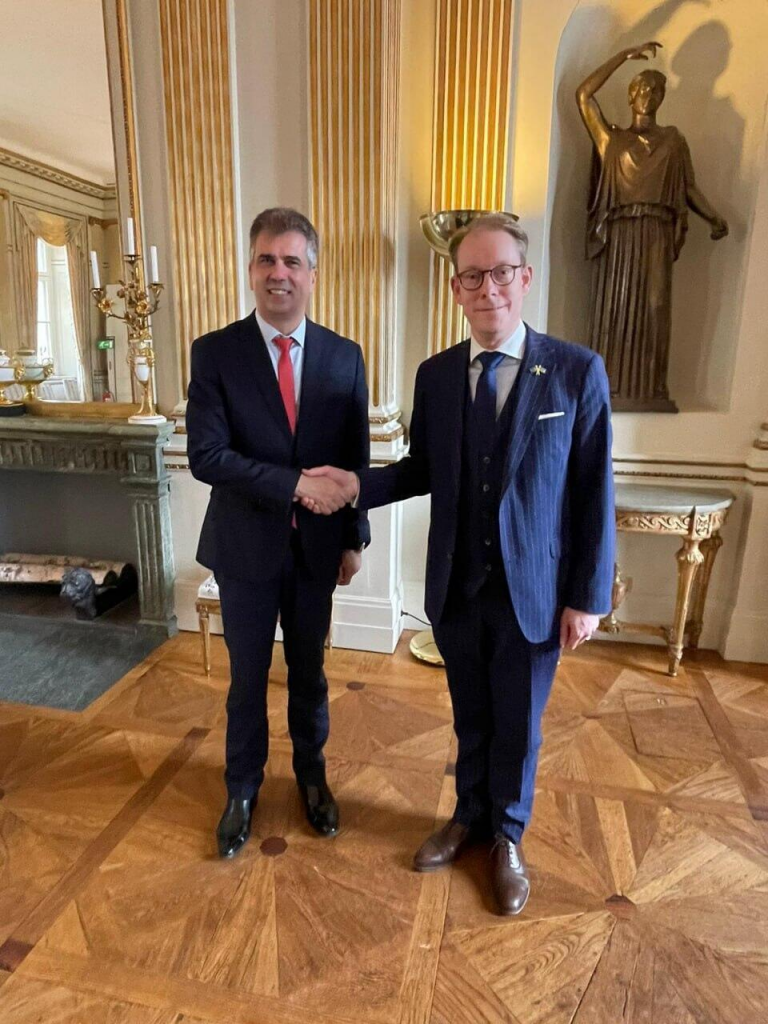In first in 22 years, Israeli FM visits Sweden and meets with Swedish counterpart Billström, whose wife volunteered on a kibbutz in the 90s, and whose grandparents hosted Holocaust survivors after the war; He also met with the deputy PM, who was photographed in the past wearing an IDF t-shirt
Foreign Minister Eli Cohen met with his Swedish counterpart Tobias Billström in Stockholm on Monday, becoming the first Israeli top diplomat to visit Sweden in 22 years, marking a new chapter in the relationship between the two countries.
The two discussed further improving bilateral ties in light of the Scandinavian country’s policy growing more amiable toward Israel in international forums.

(Photo: Israeli Embassy in Sweden)
“The visit marks a change of direction in the relations between the countries, and we are opening a new chapter,” said Cohen.
Cohen also emphasized that European Union aid money to the Palestinians must not reach terrorist organizations. In addition, the two discussed ways to confront Iranian proxies in the Middle East and Europe, and the joint struggle against antisemitism.
This is their second meeting, following their meeting in January during the World Economic Forum’s annual meeting in Davos. They discussed the prominent change in Sweden’s approach – both at the bilateral level and in international forums – and ways to strengthen economic ties between the countries, as well as people-to-people relations.
Cohen also met with Swedish Deputy Prime Minister and Minister of Industry, Energy and Environment Ebba Busch, who is a passionate supporter of Israel and was even photographed in the past wearing an IDF shirt, a gesture which was unfavorably received in Sweden.

(Photo: Israeli Embassy in Sweden)

The unplanned meeting was requested by Busch and added last-minute to the visit’s schedule. After the meeting, Busch posted on Facebook which included the lyrics to Israel’s national anthem and concluded with the words “Yom Ha’Atzmaut Sameach! Am Yisrael Chai!” (Happy Independence Day, Long Live Israel!).
During the foreign ministers’ meeting, one of the projects mentioned was “Kibbutz-Tech,” which is expected to bring hundreds of Swedish students to Israel to intern in Israeli start-up companies.
The two also discussed Cohen’s initiative which includes Israel, Sweden, South Korea, and Abraham Accords countries to establish an international fund for investments in the automotive industry, which is a strong sector for both Sweden and South Korea, in partnership with Israeli start-up companies.
The ministers also discussed the impact of the war in Ukraine on Europe and Sweden’s expected accession to NATO, which will create new opportunities for cooperation between the two countries.

(Photo: Israeli Embassy in Sweden)
Sweden recently expressed its desire to join the military alliance due to the ongoing Russo-Ukraine war, but the process has not yet been completed.
Its accession to NATO is expected to lead to a five-fold increase in defense spending, which will open up many opportunities for Israeli companies and strengthen the economic and security ties between the countries.
In addition, Billström shared with Cohen his special connection to Israel and the Jewish people: his wife volunteered on Kibbutz Mishmar HaEmek in the 90s, and his grandparents hosted Holocaust survivors in their home in Sweden after World War II.
Sweden currently serves as the President of the European Union and plays a central role in the possibility of changing Europe’s approach toward the Iranian nuclear threat and terrorism.

In the last two years, there has been a clear change in the Swedish government’s attitude toward Israel. Among other things, this change is reflected in the fact that three Swedish parties publicly support the relocation of the Swedish embassy from Tel Aviv to Jerusalem.
Sweden presents a very critical stance toward Iran, partly due to a large community of Iranian exiles in the country. Recently, the Swedish parliament voted unanimously to call on the government to declare Iran’s Revolutionary Guards a terrorist organization.
During his short diplomatic visit to Sweden, Cohen met with key members of parliament, business leaders, and representatives of the local Jewish community.
“We are turning a new page in the relationship between Israel and Sweden, after years of Stockholm leading a critical line toward Israel,” Cohen said.
“The visit to Stockholm, the first by an Israeli foreign minister since 2001, marks a shift in the relationship between the two countries. The war in Ukraine and Sweden’s expected accession to NATO can be a huge opportunity for Israel to strengthen economic ties with Stockholm and expand trade between the countries in areas such as security, innovation and fintech.”
As reported by Ynetnews
